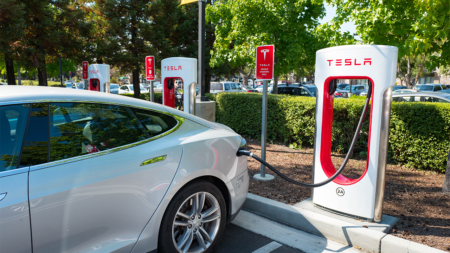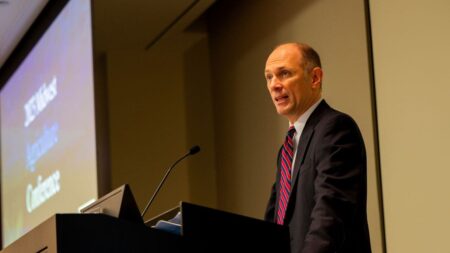So, these three middle-aged guys go in for their annual checkup. They get terrible news. They’ve got high blood pressure, bad cholesterol and if they gain another two pounds, they’ll be officially classified as “severely obese.” The doctor says that even though they feel fine now, the future is not bright.
The first guy convinces himself it’s not so bad. He tells himself it’s just a temporary thing — probably too much time at the all-you-can-eat on that last trip to Vegas — and that once things get back to normal, he’ll be fine.
The second guy goes home and tells his wife she needs to help make things right — maybe save the bacon and eggs for weekends. But then, of course, he sits down in his recliner with a bag of chips, grabs the remote and asks her to bring him a beer.
US CONSUMER SENTIMENT FALLS MORE THAN EXPECTED AS INFLATION FEARS RISE
The third guy pulls out a picture of his 2-month-old granddaughter and promises himself to change. Six months later, he’s at the gym swapping salmon recipes with his workout buddies.
The latest inflation numbers mean that the U.S. is one of those guys. Actually, we’ve been one of those guys for a while. The Federal Reserve considers an inflation rate above 2% to be unhealthy. The March consumer price index was 3.5%. That was the 36th straight month we’ve been in that danger zone. What’s worse, the numbers are going the wrong way. March inflation rate was higher than February, which was higher than January.
Until the start of 2024, there were at least some economists who were like the first guy. Yeah, they said, inflation is bad, but it’s just a temporary thing — a hangover from the pandemic, weirdness in oil markets, bird flu — stuff that will go away. A few of them still believe that, but nobody else does. There’s just too much evidence to pretend this is going away by itself.
Most of our politicians are acting like the second guy, except their long-suffering wife is The Federal Reserve. As far as I can see, none of them — and this really is a bipartisan failure — have any coherent, specific policy to combat inflation, other than telling the Fed to take care of it.
And, of course, they want their beer and chips too. The Fed is somehow magically supposed to design an interest rate policy to get inflation down without … you know … making it hard on voters who like low interest rates.
And even if the Fed does hang tough and refuses to cut rates, there’s no guarantee that will be enough. There are lots of macroeconomic problems other than interest rates. The Fed’s promise to sustain from making rate cuts is sort of like promising to quit drinking while still smoking two packs a day.
But what about the third guy? Is there a chance the bad inflation news will have us thinking about our grandkids and making promises to do things that will actually help? No sign of that yet, but let’s be hopeful. Inflation makes voters grumpy. Maybe some politicians will see that an actual coherent program — a program that risks making voters grumpy about different things — is worth a shot.
And make no mistake. It’s not like inflation is inevitable. Economists like to disagree. Most of us will tell you that there are some things that will help.
First, quit doing dumb things
There are dozens of policies out there that help a few people but cost the rest of us a lot. One study found that steel tariffs cost American consumers $900,000 for every job saved. There are lots of such things out there. They all drive prices higher.
The Fed is somehow magically supposed to design an interest rate policy to get inflation down without … you know … making it hard on voters who like low interest rates.
Second, get control of the budget
Since the start of 2020, the federal budget deficit has increased by over $10 trillion. Economic theory and everyday common sense tell us all that spending has got to be driving prices higher. Either pay for that spending or cut it out.
Few people spend much time thinking about their blood pressure or the latest numbers from the Bureau of Labor Statistics. Once in a while, we are forced to look at the grim reality. Let’s see how we react.
CLICK HERE TO READ MORE BY MICHAEL DAVIS
Michael L. Davis is an economics professor at the Cox School of Business, SMU Dallas.
Read the full article here












